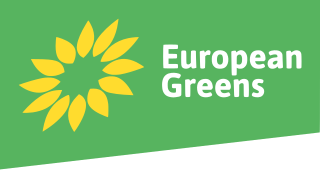
A non-governmental organization (NGO) is an independent, typically nonprofit organization that operates outside government control. NGOs often focus on humanitarian or social issues but can also include clubs and associations offering services to members. Some NGOs, like the World Economic Forum, may also act as lobby groups for corporations. Unlike international organizations (IOs), which directly interact with sovereign states and governments, NGOs are independent from them.

The European Green Party (EGP), also referred to as European Greens, is a transnational, European political party representing national parties from across Europe who share Green values.

The European People's Party (EPP) is a European political party with Christian democratic, liberal-conservative, and conservative member parties. A transnational organisation, it is composed of other political parties. Founded by primarily Christian-democratic parties in 1976, it has since broadened its membership to include liberal-conservative parties and parties with other centre-right political perspectives. On 31 May 2022, the party elected as its President Manfred Weber, who was also EPP's Spitzenkandidat in 2019.

La Strada International (LSI) is an international NGO network addressing the trafficking of persons in Europe.
The Coalition for the International Criminal Court (CICC) is an international network of NGOs, with a membership of over 2,500 organizations worldwide advocating for a fair, effective and independent International Criminal Court (ICC). Coalition NGO members work in partnership to strengthen international cooperation with the ICC; ensure that the court is fair, effective and independent; make justice both visible and universal, and advance stronger national laws that deliver justice to victims of war crimes, crimes against humanity and genocide. The CICC Secretariat is hosted by the Women's Initiative for Gender Justice and it is based in The Hague.

The Quaker Council for European Affairs (QCEA) is an international not-for-profit organisation which seeks to promote the values and political concerns of the Religious Society of Friends (Quakers) at the European level. It undertakes research and advocacy in the fields of peacebuilding and human rights policy, notably in relation to the European Union and the Council of Europe. Founded in 1979 by Quakers who worked in the European institutions, it is based in Brussels, Belgium, and is registered under Belgian law.
EuroMed Rights, formerly the Euro-Mediterranean Human Rights Network is a network of 68 human rights organisations, institutions and individuals based in 30 countries in Europe and the Mediterranean region. It was established in 1997 in response to the Barcelona Declaration, which led to the establishment of the Euro-Mediterranean Partnership.

CONCORD, also referred to as CONCORD Europe, is the European confederation of non-governmental organisations working on sustainable development and international development cooperation.

The Federal Public Service Foreign Affairs, Foreign Trade and Development Cooperation is the foreign affairs ministry of Belgium and is responsible for Belgian foreign policy, relations with the European Union, development cooperation policy and certain aspects of foreign trade policy. The central government in Brussels directs the network of diplomatic and consular representations abroad.
The European Network Against Racism (ENAR) is an EU-wide network of anti-racist NGOs. ENAR aims to end structural racism and discrimination and advocates for equality and solidarity for all Europeans. It connects local and national anti-racist NGOs throughout Europe and acts as an interface between its members and European institutions. It voices the concerns of ethnic and religious minorities in both European and national policy debates.
The Cambodian Center for Human Rights is a non-partisan, independent, non-governmental organization that works to promote and protect democracy and respect for human rights throughout Cambodia. It focuses primarily on civil and political rights and on a variety of interlinked human rights issues. The white bird flying out of a circle of sky blue on the logo of the organization symbolizes Cambodia’s quest for freedom.

Edward McMillan-Scott is a British politician. He was a pro-EU Member of the European Parliament (MEP) for York and Yorkshire and the Humber constituencies from 1984 until 2014. He was the last and one of the longest-serving UK Vice-Presidents of the European Parliament 2004–2014, holding its Human Rights and Democracy portfolio throughout. After losing his seat as an MEP he became active in campaigning against Brexit and coordinates the largest pro EU forum in the UK.
International Partnership for Human Rights (IPHR) is an international non-governmental human rights organization with its seat in Brussels, Belgium. It was established in the spring of 2008. It is a non-profit organization.
Friends of the Earth Europe (FoEE) is the European branch of the world's largest grassroots environmental network, Friends of the Earth International (FOEI). It includes 33 national organizations and thousands of local groups.
European Peacebuilding Liaison Office (EPLO) is the independent civil society platform of European NGOs, NGO networks and think tanks which are committed to peacebuilding, and the prevention of violent conflict.

The Human Rights Network - Uganda (HURINET) is a Ugandan non-governmental organization (NGO) whose mission is to foster the promotion, protection and respect of human rights in Uganda through linking and strengthening the capacity of member organizations. HURINET works towards having a Ugandan society free of human rights abuse. It is an umbrella organization of 60 human rights organizations. Mohammad Ndifuna is the current executive director.

The European Partnership for Democracy (EPD) is a membership-based network of not-for-profit organisations that describes its aim as "supporting democracy around the world".
The Palestinian NGOs Network is an umbrella organization of about 30 Palestinian non-government organisations (NGOs) in the Palestinian territories formed to enhance coordination, consultation and cooperation between member NGOs and to strengthen Palestinian civil society and contribute to the establishment of a Palestinian state. PNGO was formed in September 1993, and as of January 2020, had 135 member NGOs operating in the West Bank, Gaza Strip and East Jerusalem.
Human Rights Without Frontiers International is a non-profit organization based in Brussels, Belgium.









